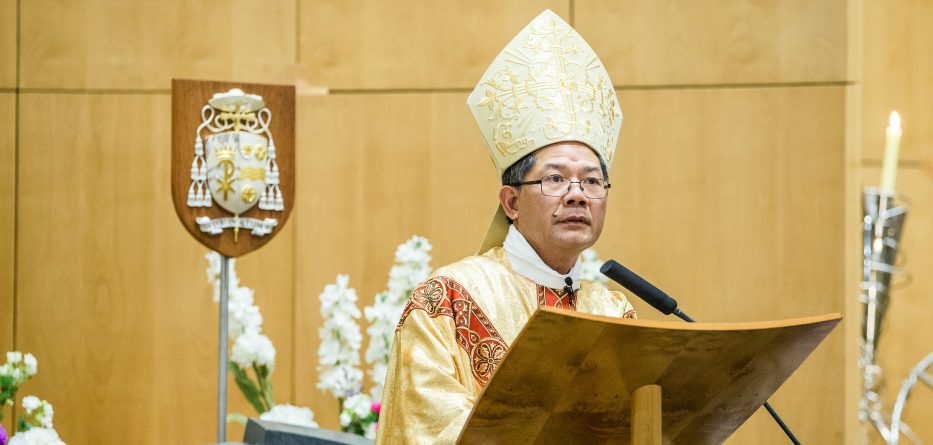Most Reverend Vincent Long Van Nguyen OFM Conv DD STL, Bishop of Parramatta
Solemnity of the Nativity of Saint John the Baptist in Year B 2018 with the Rite of Admission to Candidacy for Holy Orders at St Patrick’s Cathedral, Parramatta
24 June 2018
Sisters and brothers in Christ,
We are moved and inspired by examples of moral courage like that of Martin Luther King Jr., Mahatma Gandhi, St Maximilian Kolbe, Mother Teresa and others. They put their reputation, wellbeing and security at risk for the sake of others or a cause they believed in. They did the right thing even when it cost them dearly. Moral courage requires that we rise above the apathy, complacency, hatred, cynicism and fear.
Moral courage is in action when a board member reveals the unethical practices of his company or when a public servant challenges the government on the truthfulness of their claims. We call them whistleblowers. It is the willingness to confront situations of injustice or conflict without counting the cost to oneself. It is the commitment to truth and justice even at the hazard of incurring the ridicule of others. Pope Francis embodies moral courage in the way he takes a strong but often unpopular stand on contentious issues such as migrants and refugees, the environment and the care of the marginalised.
Today, we celebrate the birthday of St John the Baptist who also illustrated for us what it means to be a courageous witness to truth, justice and integrity. The Word of God this Sunday highlights his example and inspires us to act with moral courage and resist the tyranny of popularity. It calls upon us to embrace a discipleship of faithfulness and commitment in a world where apathy, opportunism and self-interest often win the day.
In the first reading, Isaiah reflects on his call to be God’s faithful prophet at a time of extreme hardship and adversity. Israel had been invaded and its people had been either exiled or reduced to internal displacement and a state of hopelessness. Perhaps it was not unlike what has happened in Syria and other countries in the Middle East at this moment. In the midst of these very unsettling situations, Isaiah received his prophetic calling. He was to speak God’s word of discomfort to his people as well as that of hope. He was to be a sharp sword and arrow which would pierce through the mask of security and complacency of the people. He was also to be a voice of comfort which would engender hope to the survivors of Israel. In the end, Isaiah proved to be an extraordinary prophet in extraordinary time. The exile catalysed Israel into one of the most transforming periods in its history. It learned to be God’s faithful community of solidarity and empathy again without the accummulations of wealth and power. It learned to see the error of its way when oppression and inequality had become the features of Jewish society in the land of promise. In exile, Isaiah helped interpret the signs of the times and guide his people to live in such a way that they would become the light of the nations.
We can see the similarities between Isaiah and John the Baptist. Even as an infant, John lived up to his call to afflict the comfortable. His name is not in-line with the traditions of the elders and the social norms of his time. Later on, he did not follow in his father’s footsteps as a priest at the Jerusalem Temple. Instead, he went off to live in the desert in order to devote himself more fully to God and to prepare himself to be “the voice of one crying out in the wilderness: ‘Prepare the way of the Lord’”. As an adult, John embraced his call to prepare the people of Israel for the arrival of Jesus. He continued to be an almost contradictory figure, who at the same time challenges injustice and immorality with really tough words, but who also offered God’s loving forgiveness to all those who step into the Jordan to be baptised.
St John the Baptist holds a place of special honour in the church. He stands on the watershed between the Old and the New Testaments. More importantly, he is the precursor, the forerunner, the one who went ahead to prepare the way for Jesus and His Kingdom. Indeed, the fourth gospel describes him, as a “man sent by God… who came as a witness to testify to the light, so that all might believe through him”. His example of faith should inspire all Christians to prepare the way for the Lord in our world.
Dear friends,
Let us pray for these men as they embark upon the journey of formation and transformation leading to the permanent diaconate. May they grow in their commitment to live more generously, more trustfully and yet more bravely. Let all of us be not afraid as we seek to share the Good News and to take a prophetic stance in relation to many cultural issues facing us. Today as we honour St John the Baptist, we celebrate his example of being a witness to truth, integrity and justice. We ground ourselves in the conviction that Christian life begins and ends with absolute faithfulness to God and His Kingdom. Let us pray for the prophetic courage to live and speak the inconvenient truths, in season and out of season. Let us pray that as we are immersed in truth, justice and integrity of life we become truly salt of the earth and light for the world by the transforming power of Christ.








